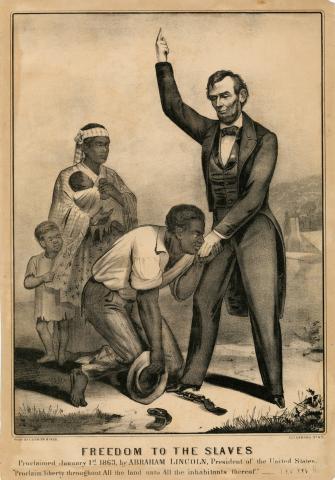Americans fought a Civil War—during which people in the North fought against people in the South—beginning in 1861 and ending in 1865. This time of troubles, in America, is also known as the War Between the States.
Even before Abraham Lincoln became the country’s 16th President, people in the South thought about leaving the Union of States. Before Lincoln was sworn-in, South Carolina seceded (left) the Union.
By June of 1861, ten more Southern States had left. Together, these eleven States became the Confederate States of America (CSA).
Fighting between both sides erupted not far from Washington (which was known, then, as Washington City instead of Washington, D.C.). The first battle took place at a Virginia creek known as “Bull Run.”
When the war was finally over:
- Hundreds of thousands of American soldiers were dead.
- American slavery was abolished.
- The South, where most of the fighting took place, had to be reconstructed.
Just like the Bill of Rights guaranteed individual liberties to Americans, former slaves also needed to have the law protect them. They needed to be assured of their civil rights, too.
To make that happen, Congress needed to amend the U.S. Constitution. Before President Lincoln died, he worked really hard to be sure that Congress passed an Amendment abolishing slavery:
- The Senate passed a resolution, to that effect, on April 8, 1864
- The House of Representatives passed the resolution on January 31, 1865
- President Lincoln approved the Joint Resolution of Congress on February 1, 1865.
Thereafter, the proposed amendment—which became the 13th—was sent to the individual states for approval.
Because the civil war was still ongoing, in February of 1865, the amendment was initially considered only by USA states, not CSA states. After the war, when the South rejoined the Union, all states considered it.
Three Amendments—the 13th, the 14th and the 15th—are collectively known as the “Civil War Amendments” and “The Reconstruction Amendments.”
What did those three amendments do?
- The 13th—ratified December 6, 1865—abolished slavery and involuntary servitude of any kind (except as punishment for a crime);
- The 14th—ratified July 9, 1868—makes former slaves U.S. citizens and gives them due process and equal protection under the law; and
- The 15th—February 3, 1870—gives African-American men, including former male slaves, the right to vote.
The impact of these Constitutional Amendments was significant. African-American men, for example, were able to—and did —vote. This worried some people in the South. They were concerned that African-Americans might be elected to leadership positions.
To prevent African-Americans from gaining political power, Southern States began to pass laws restricting the rights which the Civil-War Amendments had given them. This led to an era of legal segregation in America, often known as “Jim Crow.”
Jim Crow laws made it illegal, for example, for African-Americans to use restroom facilities which were designated for “whites only.” People of color were required to sit in the back of public-transportation vehicles, like trains and busses.
The U.S. Supreme Court held that facilities and schools could be different, for whites and blacks, as long as they were “separate but equal.” When it was clear that “separate” would never mean “equal,” the positive impact of the Civil-War Amendments deteriorated for African-Americans.
Finally, in 1964, the U.S. Congress passed a new Civil Rights Act. President Johnson signed it into law on July 2, 1964. He signed the Voting Rights Act the following year (on August 6, 1965). It had taken 100 years for America to make good on the three Civil-War Amendments.
The image, at the top of this page, depicts an undated, hand-colored lithograph by Currier & Ives. It features President Lincoln in his quest to free all of America’s slaves.





